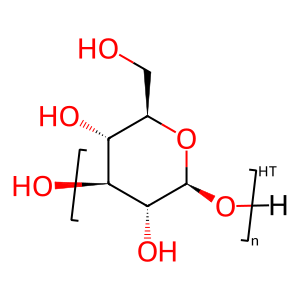Reaction: CLEC7A binds 1,3-beta-D-glucan
- in pathway: CLEC7A (Dectin-1) signaling
CLEC7A (Dectin-1) was identified as a primary receptor for beta-glucans from fungi, bacteria, and plants and specifically recognises beta 1-3 linked glucans. Human CLEC7A has eight alternatively splice products of which only two are functional for beta-glucan binding (isoforms A and B) (Willment et al. 2001). CLEC7A possesses an extracellular C-type lectin-like domain (CTLD) that is connected by a stalk region to a transmembrane domain and cytoplasmic tail, which contains an immunoreceptor tyrosine-based activation (ITAM)-like motif. Two highly conserved amino acids (222W 224H in Human; 221W, 223H in Mouse) within the CTLD which have been identified as essential for beta-glucan binding (Brown et al. 2007, Adachi et al. 2004). Through the recognition of beta-glucans, CLEC7A binds several fungal species such as Aspergillus, Candida, Coccidioides, Pencillium, Pneumocystis and Saccharimyces.
Ferwerda et al. (2009) suggest that chronic mucocutaneous candidiasis may be caused by a genetic defect of CLEC7A. The mutation of nucleotide A-->C causes a change of amino acid 238 from tyrosine to a stop codon (Tyr238*), leading to the loss of the last nine amino acids of the carbohydrate-recognition domain (CRD). This mutated form of CLEC7A is poorly expressed and does not mediate beta-glucan binding, leading to defective production of cytokines after stimulation with beta-glucans or Candida albicans (Ferwerda et al. 2009).
Ferwerda et al. (2009) suggest that chronic mucocutaneous candidiasis may be caused by a genetic defect of CLEC7A. The mutation of nucleotide A-->C causes a change of amino acid 238 from tyrosine to a stop codon (Tyr238*), leading to the loss of the last nine amino acids of the carbohydrate-recognition domain (CRD). This mutated form of CLEC7A is poorly expressed and does not mediate beta-glucan binding, leading to defective production of cytokines after stimulation with beta-glucans or Candida albicans (Ferwerda et al. 2009).
Reaction - small molecule participants:
1,3-beta-D-glucan [extracellular region]
Reactome.org reaction link: R-HSA-5607758
======
Reaction input - small molecules:
(1->3)-beta-D-glucan
Reaction output - small molecules:
Reactome.org link: R-HSA-5607758

